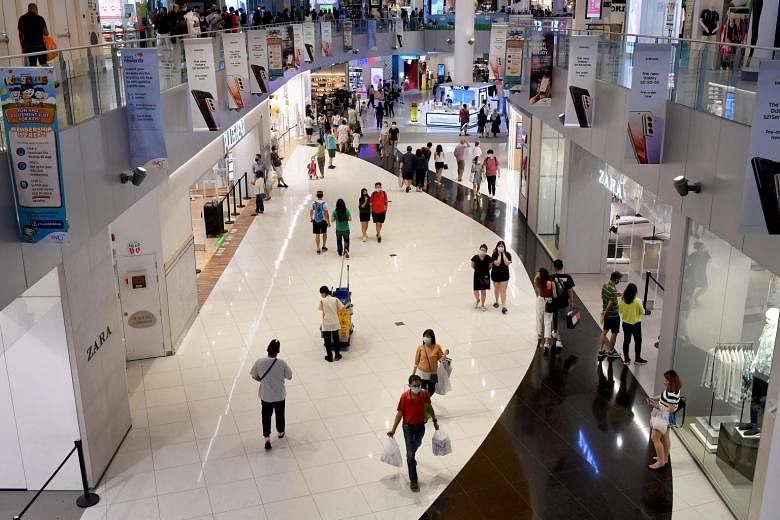SINGAPORE - Core inflation in Singapore continued its upward trend for the sixth month running in July, on the back of higher electricity and gas costs.
Core inflation, which excludes accommodation and private road transport costs, rose to 1 per cent on a year-on-year basis last month, up from 0.6 per cent in June. This was the highest increase since June 2019, in part due to low base effects and in line with figures forecast by economists in a Bloomberg poll.
Meanwhile, overall inflation edged up to 2.5 per cent, from 2.4 per cent in June. This was on account of the increase in core inflation and higher accommodation costs, said the Monetary Authority of Singapore (MAS) and the Ministry of Trade and Industry (MTI), which released the data on Monday (Aug 23).
The increase in overall inflation was due to a pickup in core inflation, as well as higher accommodation and food prices, as well as the smaller decline in retail cost and other goods, the two agencies said.
Analysts said that while overall inflation came in at its highest since November 2013, inflationary pressures such as higher raw and intermediate goods prices are transitionary and are expected to ease in coming months.
In their statement, the MAS and MTI noted that external inflation has remained elevated given the transfer of higher oil prices and cost of intermediate goods to final consumer prices, and these upward pressures on global inflation should ease over the course of the year.
Crude oil prices have moderated recently alongside higher oil production, they added.
Locally, lingering uncertainty as Singapore transitions to a virus-endemic state could weigh on consumer sentiment and hence dampen domestic price increases in the near term, the agencies said.
"Wage increases should continue to be restrained as the slack in the labour market, while diminishing, will take time to be fully absorbed," they said.
"Meanwhile, commercial rents are projected to stay low, capping overall business cost pressures. In comparison, private transport and accommodation costs should remain resilient on the back of firm demand for cars and rental accommodation."
OCBC Bank's head of treasury research and strategy Selena Ling said: "Given that international borders remain mostly closed and pending any foreign manpower policy announcements at Prime Minister Lee Hsien Loong's upcoming National Day Rally speech, there may likely be some incipient wage inflation in the pipeline."
Meanwhile, electricity and gas costs rose 9.9 per cent year on year, on the back of electricity and gas tariff increases due to a hike in global oil prices from a low base last year.
Accommodation inflation saw a 1.4 per cent uptick, driven by a larger increase in housing rents.
On the other hand, the cost of retail goods fell at a slower pace of -1.2 per cent in July compared with -1.8 per cent in June, largely due to a smaller decline in the prices of clothing and footwear.
Services inflation edged down to 1.3 per cent in July, compared with 1.4 per cent in June, due to a decline in telecommunication services fees.
At the same time, the smaller increase in car prices also led to a fall in private transport inflation, which came in at 12.6 per cent year on year in July compared with 14.9 per cent the previous month.
Maybank Kim Eng analysts Chua Hak Bin and Lee Ju Ye said that while the overall economic recovery is on track, significant uncertainty continues to cloud the outlook. These include the spread of the Delta variant of the coronavirus and lockdowns across South-east Asia.
The MAS is expected to maintain its current neutral stance on monetary policy at its October meeting, they added.
Core inflation is expected to increase gradually in the coming quarters, while overall inflation is projected to ease in the coming months as base effects fade, MAS and MTI said.
Core inflation is forecast to average between 0 per cent and 1 per cent for the year, while overall inflation is predicted to come in between 1 per cent and 2 per cent.
Correction note: This article has been edited for accuracy.


